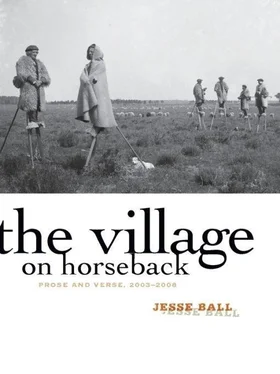and without so much as a by-your-leave,
rush off into the dew-strewn underbrush.
East Riding. It is the name that the world has
for the forest. I recall I was a child when I
heard it first. Still, I felt drawn.
I would go sometimes to the highest part
of the farm country and gaze eastward to the sea
of treetops drowsing in the distance,
hazy day, the sun’s rays mingling with the dust
and hanging in the air like the passing of hands.
I believe, I told the village priest, in East Riding.
Dismayed, he spoke with my parents,
counseling them to send me to the part of the world
farthest from East Riding.
But my father laughed. I recall this vividly.
He laughed at the priest, and raised me up
eye level into the air. He said,
“I believe you are going to East Riding.
Already you’ve left us.”
He took my mother’s hand and stood in the doorway
looking off into the distance as though watching
the progress of some traveler on a distant road.
But I was still in the house. My things weren’t even packed.
The priest stuck his sharp elbow in my ribs.
See? he said. So I slipped between my parent’s legs
and walked and walked and walked.
When I reached the distant road, I could see
that they were watching. I waved. They waved back.
And I followed the road where it went
beneath a canopy of trees.
On the deeper paths, one can’t know
for sure if one is welcome, save by clearings.
If one encounters lovely clearings
and crisp glorious mornings, then one has
cannily chosen the right path.
At other times it’s as dark as the inside
of a leaded window on an old cloudy block.
No one visits anymore, and the oldest man
is older by far than the histories he tells.
This is his defense, and it’s a keen one.
So I know to turn back, sometimes.
Always, it’s then one is given a small but kind
clearing to sleep in, and a tiny rose in greeting.
Be thou pleased by the day, and by waking
to light. From the bottom of a well
comes the vaguest song, but it is, I think,
known to you, muttered in your aging heart.
For if we all do not know a thing,
then no one can know it. It is not given us
to have that which is not instinctively
present in the world. On the softest grass
imaginable, I lay my head. It is quiet
and the path has been lost.
The path, I say, has been lost.
It is lovely to say things in a human voice
and hear in your mind or in the air,
and hear in the forest a human reply.
Grimoir or the hole beside the millstream
Little Teag was sleeping on a bed of moss. Just then up crept a satyr, the cruelest, most straying, canceling satyr of them all. He stripped poor Teag down to the bone with his sharp teeth and left the little skeleton for someone else to find. Such a delicate skeleton. I came upon it while walking. I pointed to it with my hand, and went to it with my feet. John Spence, who was along, did not come closer. He said it wasn’t a proper burial. I said we should give it one. And so we had my little sister out with us next day dressed up in ribbons and lace, and I wore my high collar and Spence had a good cap. We wrapped the little fellow in a clean sheet of linen and brought him down to a hole we’d dug by the millstream. I said a few words then, like a deacon, I said, “IF it was a satyr that did this, or a lamb, neither will I worship. Braver than the soil is the flesh that lends it breadth.” And through the woods then the satyr came, galloping on its hind legs. We hid in the grave ’til it had gone, and only then emerged to lay upon the ground in the groggy afternoon, listening to the brook. Before we left I filled the hole, spreading the earth flat enough for any boy to walk upon. John Spence marked it with a stone, in case we should ever again need a hiding place in that part of the forest.
And being wrong about the colors light takes in the eyes of my animals,
I wonder now what many failures
of difference I have made,
trying to map the catchments of other lives
with brown scenes from this single self.
Missive in an Icelandic Room
RITA KEPT LAZARUS IN A CHINESE BOX & FED HIM PEPPERMINTS UNTIL HE NO LONGER KNEW WHO OR WHAT HE WAS. THEN SHE GAVE HIM A PAPER CROWN AND A JAR WITH A TADPOLE AND BADE HIM SIT BESIDE HER.
And If They Should Tell You
That I have debauched the youth of this town. That further, I,
a youth of this town, have been
debauched, have helped in the debauching of others. Have helped
myself in and to the debauching
of the others, well. . I would not be overly troubled at the news.
For you see, I have a new
project in mind. Imagine a house, a shack rather, in some flyspeck
town. Within the house, a trap door.
And beneath the door, an entire realm of wickedness!
He who first spoke of it
has promised we will meet there, and I must confess, I look now
often at the map he left,
look often upon those impressions his thin and supple fingers
made in oily remark.
Missive in an Icelandic Room 2
Harangued
by the ring
master, the
paper circus
fell to
muttering.
Johan wrung
his hand
and stroked
the elephant’s
thick skin.
“How will
we fathom
the mind of
the audience,
if we cannot
name it truly
our oldest
and deepest
foe?”
A young king is unhappy. He takes
to going out with a false beard,
sackcloth robes, a long knife, a leather bag.
He soon becomes known about town in this capacity,
and liked. He takes a mistress. He spends time
in common taverns, in playhouses.
No one knows his secret, save a palace guard
his own age, who lets him out of the castle each night.
One night the disguised king
returns to the castle, only to find the guard,
now also disguised, ruling from his throne.
Before the King can speak, the new King orders him seized
by palace guards who cut out his tongue
and cart him away to a nearby asylum.
He is heard from no more.
The new King despises his children
and has them strangled. On the other hand,
he takes great pleasure in his association with the Queen,
who has guessed nothing.
One day it is announced before the court
that a madman is at the gates, claiming to be the King.
The King grants him an audience, at which time
the madman tells the court the story
that you have just been told, this time
through a series of hand gestures. Naturally,
no one is convinced. The King, however,
takes pity on the man, and allows him
to take up service as his jester, in which capacity,
I may happily relate, the man excels.
Word of the mute jester spreads,
and soon the court of this King is spoken of
throughout many lands
as a place of enlightenment and culture.
She wanted desperately to know
what was in the green box.
A green box on a coarse black cloth
in a burnished-gold room.
She leaned in close,
her soft hair falling across
both our faces.
If only, she breathed,
Читать дальше












